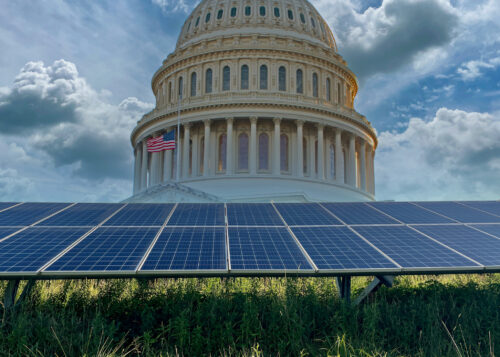Climate Change Congress Legislation

RMI: Treasury’s 45X guidelines will supercharge U.S. clean energy manufacturing & technological innovation
From wind blades to solar wafers, building cleantech in America just got cheaper.
Innovative industrial decarbonization tech like thermal batteries just got “too cheap not to build.”
December 14, 2023, Washington, D.C. — Today, the US Department of the Treasury unveiled initial guidance on one of the highest-value tax credits in the Inflation Reduction Act, the 45X Advanced Manufacturing Production Tax Credit, which incentivizes the domestic production of solar, wind, inverter, and battery components. This guidance provides certainty to investors on the specific technologies and production conditions that qualify for the tax credit, which will unleash additional investment in American clean energy manufacturing. The specific inclusion of thermal batteries in this tax credit enables the deployment of a technology that is vital to industrial decarbonization.
In response to Treasury’s 45X guidance, RMI federal policy expert John Coequyt released the following statement:
“The Advanced Manufacturing Production Tax Credit makes it cheaper to manufacture clean energy components in America. Now, with Treasury’s implementation guidance, we know exactly which technologies can qualify for this huge credit, and in which contexts. This clarity enables investors to move forward with new manufacturing projects that will deliver jobs and investment to communities across the United States. Increased domestic manufacturing will increase American economic competitiveness globally while reducing price volatility for key clean technologies.”
“Critically, these tax credits apply to thermal batteries, a technology that is vital to industrial decarbonization. Heat is to heavy industry what snow is to skiing — irreplaceable — and producing this heat cost-effectively at the temperatures required has typically required the burning of fossil fuels. But thermal batteries can deliver heat at over 1000 degrees Celsius, which can meet over 90 percent of these industrial heat needs. Thanks to Treasury’s implementation of the Advanced Manufacturing Production Tax Credit, thermal batteries will soon be too cheap not to build as part of a competitive national industrial base.”
Additional Context:
Advanced Manufacturing Production Tax Credit
The Advanced Manufacturing Production Tax Credit enables the innovative production of critical clean energy components and the expansion of the Inflation Reduction Act-powered manufacturing boom. This tax credit is available only to domestic manufacturers.
For solar, wind, battery, and inverter component manufacturing, the tax credit is available through 2029 before stepping down and expiring in 2032. The tax credit values battery modules at $45 per kilowatt-hour.
Across all components, the Advanced Manufacturing Production Tax Credit will catalyze hundreds of billions of investment into the American manufacturing sector over the next ten years. Since the passage of the Inflation Reduction Act, private sector actors have invested $65 billion in manufacturing industries covered by this tax credit.
Industrial heat represents roughly 9% of U.S. greenhouse gas emissions, and abating this pollution has proved difficult. Thermal batteries are a gamechanger. They convert electricity energy into heat, preserve the energy for hours or days, and release it — at temperatures of up to 1,700 degrees Celsius. That’s hot enough to meet over 90% of the industrial heat needs supplied today by combustible fossil fuels. For heavy industry, the advantages of thermal batteries extend past the delivery of heat:
- Long lifetimes and only require a one-time up-front cost.
- Deliver heat at a cost that is competitive with methane equipment.
- Contains only commonly used materials (as opposed to critical minerals).
- Efficiently store energy, with only minor heat loss.
- Charged intermittently from both grid-connected and off-grid sources, allowing facilities to charge them whenever electricity is cheapest (and cleanest).
Investment in thermal batteries is about to boom as a result of Treasury’s implementation of the Advanced Manufacturing Production Tax Credit. Soon, thermal batteries will be practically too cheap not to build.
About RMI.
RMI is an independent nonprofit founded in 1982 that transforms global energy systems through market-driven solutions to align with a 1.5°C future and secure a clean, prosperous, zero-carbon future for all. We work in the world’s most critical geographies and engage businesses, policymakers, communities, and NGOs to identify and scale energy system interventions that will cut greenhouse gas emissions at least 50 percent by 2030. RMI has offices in Basalt and Boulder, Colorado; New York City; Oakland, California; Washington, D.C.; and Beijing.
For media inquiries:
Adam Beitman, abeitman@rmi.org